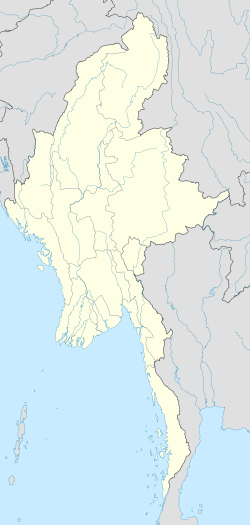Payathonzu (Pwo Eastern Karen: ကၠံင်သိုင့်ဖၠုံးဍုံ; Burmese: ဘုရားသုံးဆူမြို့; Mon: ဍုင်ကျာ်ပိ) is a town in the Karen State of south Myanmar, close to the border with Thailand. It is separated from the Thai border township of Nong Lu by the Three Pagodas Pass. It is also the administrative seat of Hpayarthonezu Sub-township (fourth-level administrative division of Myanmar) in Kyain Seikgyi Township, Kawkareik District of Kayin State in Myanmar.[2]
Payathonzu
ဍုင်ကျာ်ပိ | |
|---|---|
Town | |
 Statues in Payathonzu | |
| Coordinates: 15°18′0″N 98°23′0″E / 15.30000°N 98.38333°E | |
| Country | |
| Division | |
| District | Kawkareik District |
| Township | Kyain Seikgyi Township |
| Subtownship | Hpayarthonesu |
| Elevation | 728 ft (222 m) |
| Population (2014) | |
• Town | 27,311 |
| • Urban | 5,878 |
| • Rural | 21,433 |
| • Religions | Buddhism |
| Time zone | UTC+6.30 (MST) |
| Area code | း58[1] |
Overview
editPayathonzu is home to Karen and Mon people. Separatist armies have been active in the town. Since 1990, it is under control of the Myanmar Army,[3] however there is still occasional fighting in the area.[4] In September 2023 it was reported that although the military still had a presence in the town, administrative and judicial affairs were largely under the control of the Karen National Union.[5]
The Tai Ta Ya monastery is located in the town, and features a long row of statues.[6][7]
Payathonzu can be accessed from the Thai side via the Three Pagodas Pass. The border may not be open to foreign visitors.[8]
Camp Paya Thanzu Taung
editCamp Paya Thanzu Taung (also Kilo 108)[9]) was a prisoner of war camp during World War II on the Burma Railway. It was located about 500 metres north of the border. The first prisoners arrived in March 1943, and were mainly Dutch.[10] Later, they were joined by British and Australian prisoners.[9] The conditions were really bad with barely any food resulting in many deaths. After September 1943, the camp was used for maintenance of the rail road.[10] The camp was abandoned in March 1944.[9]
References
edit- ^ "Myanmar Area Codes". Archived from the original on 2009-12-01. Retrieved 2009-04-10.
- ^ "Township map of Kyainseikgyi" (PDF). Myanmar Information Management Unit (MIMU). 3 May 2016. Archived from the original (PDF) on 12 June 2018. Retrieved 22 November 2017.
- ^ Andrew Selth. "Incident at Three Pagodas Pass". The Interpreter at Lowy Institute. Retrieved 4 February 2022.
- ^ "Battle erupts in Myanmar opposite Three Pagodas Pass". Bangkok Post. 25 April 2021. Retrieved 4 February 2022.
- ^ "KNU Consolidates Full Control over Three Pagodas Pass (Payathonzu ) Area Administration, in spite of Junta Battalion and BGF Presence". Burma News International. Retrieved 2024-03-26.
- ^ "Myanmar Votes - 08 Nov 2010". Reuters. Retrieved 4 February 2022.
- ^ "Conflict ongoing despite KNU and NMSP agreement". Myanmar Peace Monitor. 25 October 2019. Retrieved 5 February 2022.
- ^ "Sangkhlaburi". Renown Travel. Retrieved 4 February 2022.
- ^ a b c "Paya Thanzu Taung (108 Kilo)". Far East POW Family. Retrieved 4 February 2022.
- ^ a b "Payathonzu – 307 (108)". Japanese Krijgsgevangenkampen.
External links
edit- Media related to Payathonzu (Kayin State) at Wikimedia Commons
- Payathonzu travel guide from Wikivoyage
